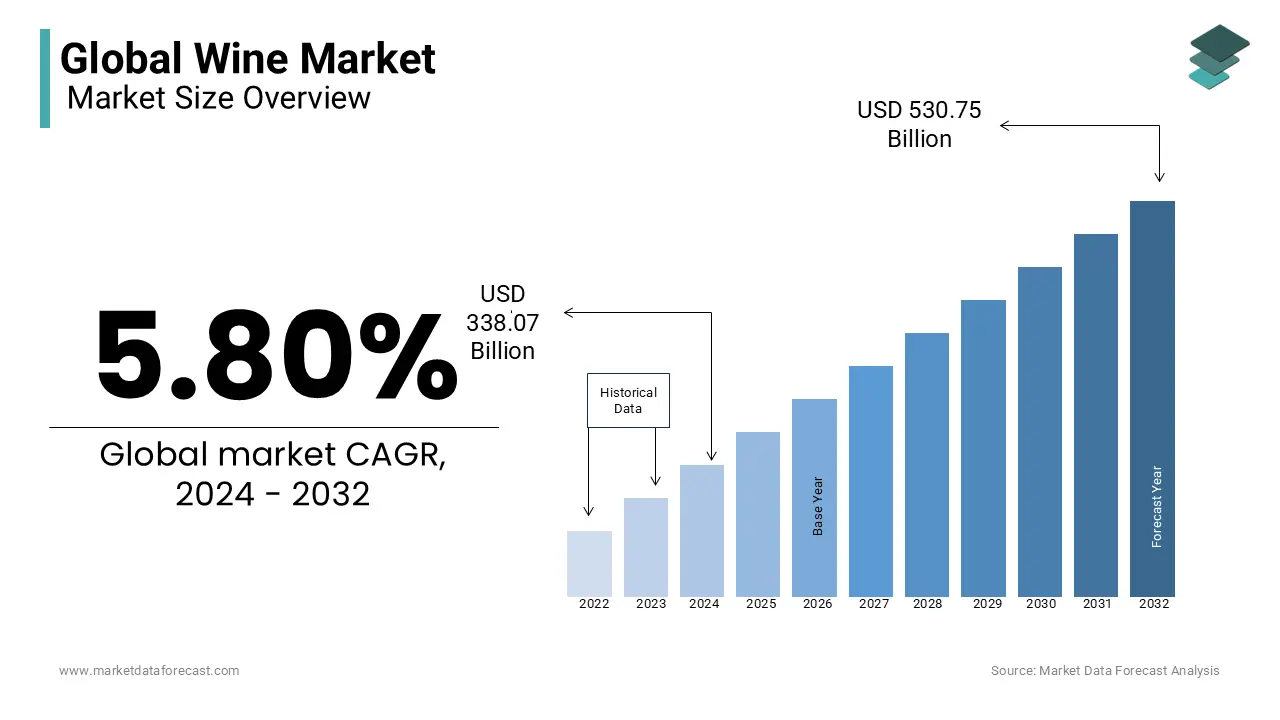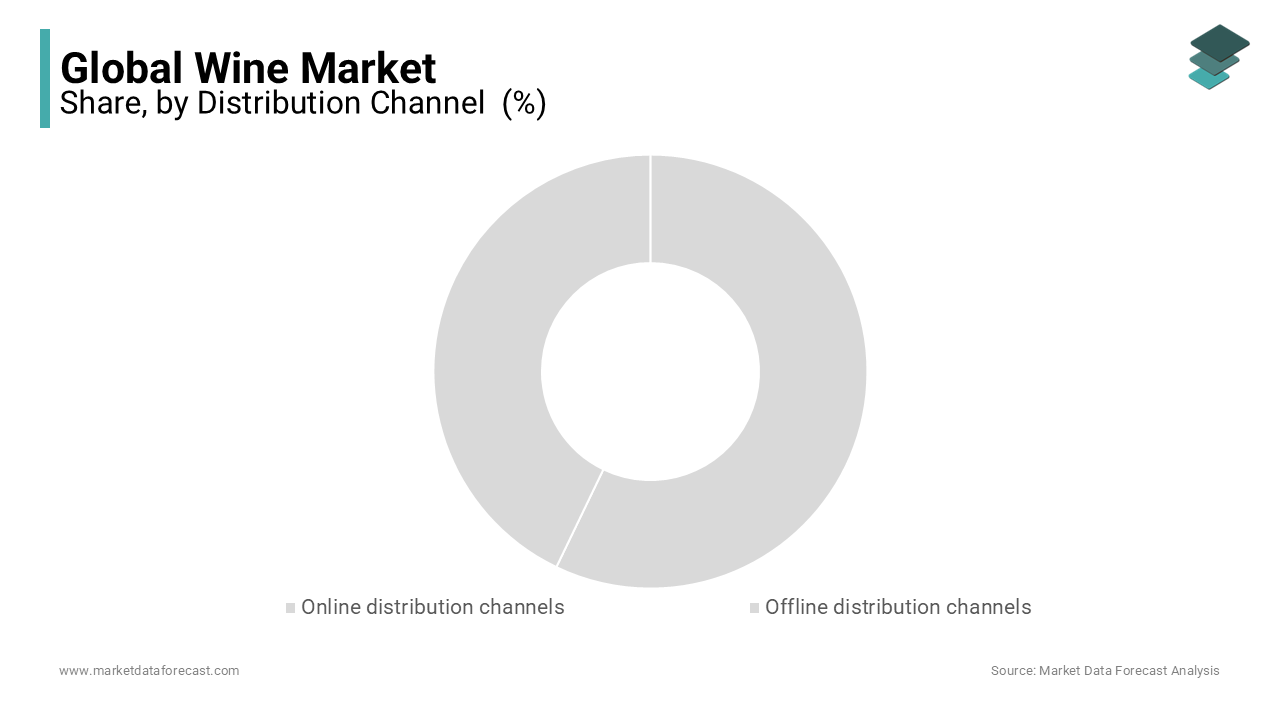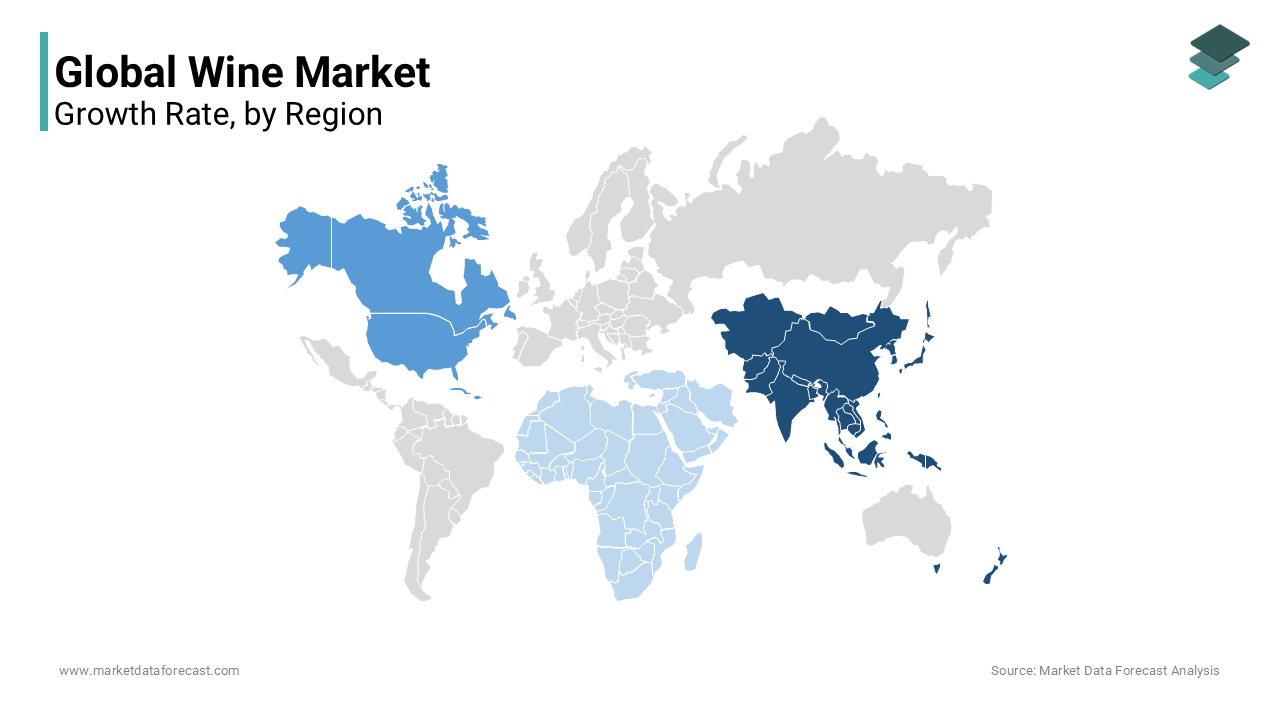Global Wine Market Size, Share, Trends, Growth Report & Analysis By Color (Rose Wine, White Wine, Red Wine, And Others), Taste (Dry, Medium, And Sweet Wine), Product Type (Still Wine, Sparkling Wine, Dessert Wine, And Fortified Wine), Distribution Channel (Online And Offline), And Regional Forecast 2025 To 2033
Global Wine Market Size
The global wine market size was calculated to be USD 338.07 billion in 2024 and is anticipated to be worth USD 561.54 billion by 2033 from USD 357.68 billion In 2025, growing at a CAGR of 5.80% during the forecast period.

Wine is a grape product obtained during fermentation. The grapes used in the production of wine are called wine grapes because they are different from ordinary grapes. In wine production, yeast is used to convert sugar into ethanol and carbon dioxide. You can get it without adding acids, enzymes, water, or other nutrients. The time that the fermented product comes into contact with the grape skin determines the intensity of the wine color that can be obtained. Sometimes, other fruits are also used to produce fruit wine. Wine grapes are smaller, have a spicy taste, and have thick, chewy skin. Red grapes are used to produce red and rosé wines, while white grapes are used to produce white wine. Different types of wine are made using different types of grapes along with different types of yeast. The growing popularity of vineyards as tourist attractions, the increase in disposable income, the increase in foreign tourists, and the promotion of healthy wines are some of the reasons for this business growth.
MARKET DRIVERS
Rapid urbanization, high disposable incomes, and changing lifestyles are majorly driving the growth of the global wine market as wine products rise in popularity during social events.
In recent years, there has been an increase in demand for wine around the world. Health-friendly wines are gaining social recognition, driving the market growth. An aging population that prefers wine to alcoholic beverages is also increasing the demand for wine around the world. Wine contains antioxidants that, when consumed, fight free radicals to prevent diseases such as cancer. The wine market is driven by a growing demand for wines due to the health benefits and premiumization of wine products, aromatic innovations, and the most advanced distribution networks in the world. The health benefits and premiumization of wine products, along with flavor innovations and the most advanced distribution networks around the world, are the main factors driving the growth of the global wine market. The rise in the number of young wine connoisseurs has increased the prevalence of wine products and wine-tasting events around the world. Exposing it to other countries where traveling the world and drinking wine is part of their lifestyle also helps boost wine sales in India. Changes in taste and new consumer preferences, along with growing demand for new and exotic flavors, such as Riesling wines and other tropical fruit wines, are expected to drive growth in the wine market. This is expected to increase the demand for wine among health-conscious consumers. Wine is known to provide several health benefits, such as reducing the risk of stroke, increasing bone density, and strengthening the immune system.
The growth of the global wine market is also driven by the growing population that consumes wine and sees it as a form of social recognition.
Changes in lifestyle and consumer income are accelerating the global wine market. The rapidly growing young population with increasing disposable income in many developing countries around the world is expected to drive the growth of the global market. The growth of the global wine industry is expected to accelerate as the acceptance of alcoholic beverages in developing countries increases due to changes in perceptions of alcoholic beverages. The fast-growing food service industry is expected to drive demand for wine around the world.
MARKET RESTRAINTS
An increase in wine prices due to high production costs is limiting the world wine market.
Wine is consumed mainly by some sectors of the population since not everyone can afford it. Besides, increased government rules and regulations and the imposition of taxes are hampering the expansion of the world wine market. Heavy government taxes and legal regulation on wine are major factors hampering the growth of the wine market. One of the main obstacles to the growth of the wine market is that wine prices are relatively very high compared to other spirits, and India is a price-sensitive country that generally does not prefer wine consumption. Furthermore, the availability of other alcohol substitutes may hamper the growth of the world wine market. Despite the growing number of Indian winemakers, the consumption of imported wines is high in India.
REPORT COVERAGE
|
REPORT METRIC |
DETAILS |
|
Market Size Available |
2024 to 2033 |
|
Base Year |
2024 |
|
Forecast Period |
2025 to 2033 |
|
CAGR |
5.8% |
|
Segments Covered |
By Color, Taste, Product Type, Distribution Channel and Region |
|
Various Analyses Covered |
Global, Regional and Country Level Analysis; Segment-Level Analysis; DROC; PESTLE Analysis; Porter’s Five Forces Analysis; Competitive Landscape; Analyst Overview of Investment Opportunities |
|
Regions Covered |
North America, Europe, APAC, Latin America, Middle East & Africa |
|
Market Leaders Profiled |
E&J Gallo Winery, Constellations Brand, The Wine Group, Compagnia Del Vino SRL, Bacardi Limited, Caviro, Torres, Grupo Peñaflor SA, Treasury Wine Estates, Castel Group, Vina Conch, Toro, Distell Group, International Beverage Holdings, Global Drinks Finland, Amvyx SA, John Distilleries, Constellation Brands, Pernod Ricard, Gruppo Campari, Accolade Wines, Soyuz Victan, SPI Group, The Wine Group and Diageo plc |
SEGMENTAL ANALYSIS
Global Wine Market Analysis By Distribution Channel

Offline wine distribution channels are segmented into specialty stores, hypermarkets, supermarkets, and convenience stores. The online wine distribution channel is expected to expand rapidly during the forecast period due to increased internet facilities, convenience, and the presence of many brands. However, offline wine distribution channels are expected to dominate the market due to the presence of an organized wine retail network in both developed and developing countries. Supermarkets and hypermarkets are the most popular places for selling wine.
REGIONAL ANALYSIS
North America, Europe, Asia Pacific, Latin America, the Middle East, and Africa are regional segments of the global wine market. The Asia Pacific region is expected to experience the highest growth rates in the forecast period due to growing demand for wine and increased wine production in developing countries. The Asia Pacific region drives demand for wine, and China dominates the region's market. Australia ranks second in wine consumption in the Asia Pacific region, followed by Japan. The Philippines, South Korea, and Vietnam are other potential wine consumption markets in the Asia Pacific region. Hong Kong has no import taxes on wine, which is the driving force in the market. China is one of the main markets for red wine consumption, and competition with France and Italy is fierce. Drinking red wine is more of a Chinese tradition, especially in China, as red wine is considered lucky. Growth in Europe is expected to be steady as there are many wine producers and wineries in the region. North America is expected to remain an important region during the forecast period due to increased wine production. Latin America, the Middle East, and Africa are also expected to see a steady increase in wine market demand during the forecast period. The increasing middle-class population expands demand in these countries, particularly in Brazil, with major initiatives by companies like Expand Importadora and InterfoodImportação to augment the consumption of wines.
KEY PLAYERS IN THE GLOBAL WINE MARKET
Major Key Players in the global wine market are E&J Gallo Winery, Constellations Brand, The Wine Group, Compagnia Del Vino SRL, Bacardi Limited, Caviro, Torres, Grupo Peñaflor SA, Treasury Wine Estates, Castel Group, Vina Conch, Toro, Distell Group, International Beverage Holdings, Global Drinks Finland, Amvyx SA, John Distilleries, Constellation Brands, Pernod Ricard, Gruppo Campari, Accolade Wines, Soyuz Victan, SPI Group, The Wine Group and Diageo plc.
RECENT HAPPENINGS IN THE MARKET
- In April 2019, Bishop Cider launched Uncommon Wine, a wine in canned women's power session. This wine has an alcohol content of less than 5%, which is why it is called session beer.
DETAILED SEGMENTATION OF GLOBAL WINE MARKET INCLUDED IN THIS REPORT
This research report on the global wine market has been segmented and sub-segmented based color, taste, product type, distribution channel & region.
By Color
- Rosé wines
- Red wines
- White wines
By Taste
- Dry
- Medium
- Sweet
By Product Type
- Sparkling wines
- Dessert wines
- Still wines
- Fortified wines
By Distribution Channels
- Online distribution channels
- Offline distribution channels
By Region
- North America
- Europe
- Asia-Pacific
- Latin America
- Middle East and Africa
Frequently Asked Questions
1. What are the current trends in the wine market?
The current trends in the wine market are increased demand for organic and sustainable wines, Growth of online wine sales and direct-to-consumer models, rising popularity of premium and luxury wines, and Expansion of wine tourism and experiential offerings.
2. What are the challenges facing in the wine market?
The Challenges facing the wine market are Competition from other alcoholic beverages like craft beer and spirits, Fluctuations in grape yields and quality due to climate variability, and Compliance with regulatory requirements and labeling standards.
3. What factors are influencing the growth of the wine market?
The factors influencing the growth of the wine market are changing consumer lifestyles and preferences, the Influence of social media and digital marketing on consumer behavior, and the Growing interest in wine as a cultural and social experience.
Related Reports
Access the study in MULTIPLE FORMATS
Purchase options starting from $ 2500
Didn’t find what you’re looking for?
TALK TO OUR ANALYST TEAM
Need something within your budget?
NO WORRIES! WE GOT YOU COVERED!
Call us on: +1 888 702 9696 (U.S Toll Free)
Write to us: [email protected]
